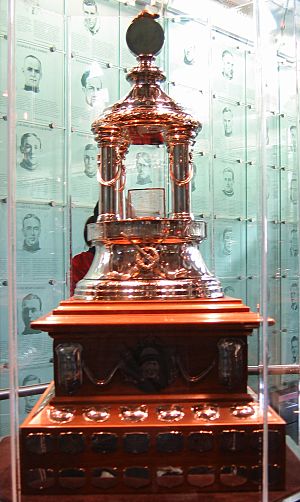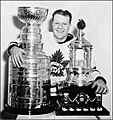Vezina Trophy facts for kids
Quick facts for kids Vezina Trophy |
|
|---|---|
 |
|
| Sport | Ice hockey |
| Given for | National Hockey League's goaltender who is "adjudged to be the best at this position" |
| History | |
| First award | 1926–27 NHL season |
| First winner | George Hainsworth |
| Most wins | Jacques Plante (7) |
| Most recent | Connor Hellebuyck Winnipeg Jets |
The Vezina Trophy is a special award given every year to the best goaltender in the National Hockey League (NHL). Goaltenders are the players who guard the net and try to stop the puck from going in. At the end of each hockey season, the general managers from all 32 NHL teams vote to pick the winner.
This award is named after Georges Vezina, a famous goaltender who played for the Montreal Canadiens from 1910 to 1925. Sadly, he passed away in 1926 from tuberculosis. The trophy was first given out after the 1926–27 NHL season. For many years, it went to the goalie (or goalies) on the team that let in the fewest goals. But since the 1981–82 season, it's given to the goalie who is thought to be the very best at their position. The William M. Jennings Trophy now goes to the goalies on the team with the fewest goals against.
The most recent winner of the Vezina Trophy is Connor Hellebuyck from the Winnipeg Jets, who won it in the 2024–25 season.
Contents
History of the Vezina Trophy
The Vezina Trophy was created to honor Georges Vezina, a legendary goaltender for the Montreal Canadiens. In 1925, Vezina became very sick during a game and was diagnosed with tuberculosis. He passed away in 1926. To remember him forever, the owners of the Canadiens team gave this trophy to the NHL.
The first Vezina Trophy was awarded at the end of the 1926–27 NHL season to George Hainsworth. He was the new goaltender for the Montreal Canadiens, taking Vezina's place.
How the Winner Was Chosen (1946–1981)
For a long time, from 1946 to 1981, the Vezina Trophy was given to the goaltender(s) of the team that allowed the fewest goals during the regular season. This meant it wasn't always about who was the best individual goalie, but rather which team had the best defense. If a team had two goalies, the one who played the most games usually got the trophy.
Later, the NHL changed the rule to allow teammates to share the Vezina Trophy if they both played at least 25 games for the team that let in the fewest goals. This happened for the first time in the 1964–65 NHL season with Johnny Bower and Terry Sawchuk of the Toronto Maple Leafs.
How the Winner Is Chosen Now (1981–Present)
Starting with the 1981–82 NHL season, the way the Vezina Trophy winner is chosen changed. Now, it's given to the most outstanding goaltender, as voted by the general managers of all the NHL teams. This means it's about who is the best individual goalie, not just who is on the best defensive team.
The general managers vote at the end of the regular season. They pick their top three goalies, giving points for each choice. The three goalies with the most votes become finalists, and the winner is announced at the NHL Awards ceremony after the playoffs.
The William M. Jennings Trophy was created to take the place of the old Vezina rule. It's now given to the goalie (or goalies) who play at least 25 games for the team that allows the fewest goals in the season.
Vezina Trophy Records
Jacques Plante holds the record for winning the Vezina Trophy the most times, with seven wins. Bill Durnan and Dominik Hasek are next, each with six wins. Dominik Hasek has won the most Vezinas under the current system, where goalies are voted on for being the best individual player.
The Montreal Canadiens team has had players win the Vezina Trophy 29 times, which is more than any other team.
Only a few players have won both the Vezina Trophy and the Hart Memorial Trophy (given to the league's most valuable player) in the same season. These include Jacques Plante (1961), Dominik Hasek (1996, 1997), Jose Theodore (2001), Carey Price (2014), and Connor Hellebuyck (2024).
Winners
Winners from 1927 to 1981
During this time, the Vezina Trophy was given to the goaltender(s) of the team that allowed the fewest goals against them during the season.
Player elected to Hockey Hall of Fame
Winners from 1981 to Present
Since the 1981–82 season, the Vezina Trophy has been given to the goaltender voted as the most outstanding in the league.
Player is still active in the NHL Player elected to Hockey Hall of Fame Player not yet eligible for the Hockey Hall of Fame
Images for kids
-
Turk Broda, a two-time Vezina winner.
-
Tony Esposito, who won the Vezina three times.
-
Patrick Roy, a three-time Vezina winner.
-
Dominik Hasek, who won the Vezina six times.
-
Martin Brodeur, a four-time Vezina winner.
-
Miikka Kiprusoff, a one-time Vezina winner.
-
Sergei Bobrovsky, a two-time Vezina winner.
-
Carey Price, a one-time Vezina winner.
See also
 In Spanish: Trofeo Vezina para niños
In Spanish: Trofeo Vezina para niños
 | Janet Taylor Pickett |
 | Synthia Saint James |
 | Howardena Pindell |
 | Faith Ringgold |











